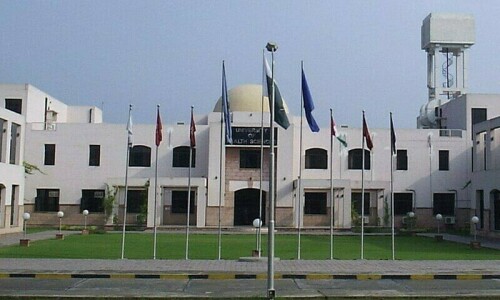LAHORE: The Turkish International Cooperation Agency (TIKA) will extend cooperation to improve the overall skill and expertise of the Pakistani workforce in the value-added textile sector.
This was stated by TIKA Country Coordinator for Pakistan Mustfa Giray Tezel during a meeting with the executive committee members of the Pakistan Readymade Garments Manufacturers and Exporters Association (PRGMEA) here on Saturday.
Mr Tezel said his country would cooperate in upgrading of textile curricula in addition to providing experts and master trainers to improve the overall skill and expertise of the Pakistani workforce.
“We would arrange Turkish experts to impart training to the Pakistani workforce in order to fulfill the requirement of local industrial textile units especially those engaged in export to European countries,” said Mr Tezel who was leading a TIKA delegation.
Earlier, PRGMEA executive committee members informed the TIKA delegation that the value-added textile sector of Pakistan was facing shortage of at least 40,000 skilled workers annually and after establishment of Quaid-i-Azam Apparel Park in Sheikhupura and the garment city in Faisalabad, the requirement will touch the level of 400,000 skilled labour per annum.
The value-added textile sector was short of 20,000 skilled workers in Karachi, 10,000 in Lahore, 5,000 each in Faisalabad and Sialkot.
Mr Tezel said that his meeting with PRGMEA members would help him understand grey areas where the Pakistani textile industry required necessary skills and expertise.
PRGMEA North Zone vice-chairman Jawwad Chaudhry told the delegation that taking advantage of GSP Plus through skilled workers and fashion designing was largely based on high technology manufacturing equipment and training to around 10 million workers across the country.
PRGMEA chief coordinator and former chairman Ijaz Khokhar said the manufacturing of fashion apparel was key to capitalize on the GSP Plus.
He said the garment sector was one of the most labour intensives as presently, 40 per cent or 2.5 million of country’s skilled and semi-skilled labour force was engaged in the garment sector.
“The $1.2 billion industry of Sialkot is running below capacity by at least 30pc partly due to energy issue and mainly owing to crucial shortage of skilled as well as semi-skilled workforce,” he said.
Published in Dawn, June 1st, 2014













































Dear visitor, the comments section is undergoing an overhaul and will return soon.